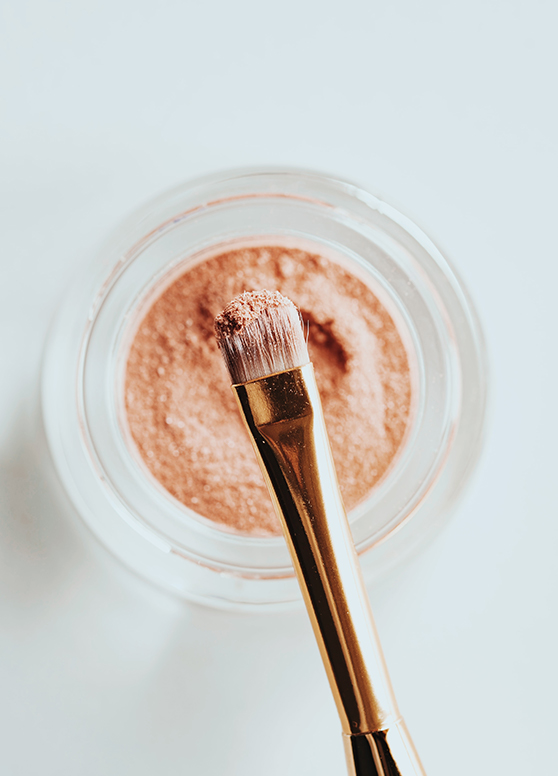
MAY 19, 2020 / Skincare
What’s Really In Your Makeup?

Day after day, year after year, we use all kinds of cosmetics to bronze, powder, conceal, and define. We see a pretty label, read a few good statements, and we grab it and go. But what really lurks inside that makeup?
If you’re dealing with acne, rosacea, or any other skin concern, the makeup you wear everyday can make these issues worse. Most foundations you come across in Sephora and Ulta, for instance, are flooded with unnecessary ingredients your skin is begging you to avoid.
Unnecessary Fragrance
If you have sensitive skin, I would advise you avoid makeup and skincare that are formulated with fragrance.
Extracts, essential oils and synthetic fragrance are all commonly added to products. Certain fragrances can be very sensitizing, cause allergies, and increase flare ups of rosacea and acne. If you aren’t sensitive to fragrance I would recommend using a product containing synthetic fragrance rather than an essential oil, as they are more stable than natural oils. Synthetic fragrances are formulated in a lab to avoid common allergies. If you desire to use a fragranced product, I recommend a wash off product like shampoo, body wash, or hand soap. For leave on products, especially for the face, fragrance free would be a better option, for all skin types, in my opinion.
Alcohols To Avoid In Makeup
“Fatty alcohols” or larger molecular weight alcohols are non drying and leave the skin hydrated. They are used to thicken a formulation and provide a moisturizing texture. Examples include cetearyl, cetyl, and stearyl.
Low molecular weight alcohols include isopropyl, ethanol, sd alcohol and denaturant. These alcohols are more drying and leave a matte finish. They’re not something to be afraid of.
However with constant everyday use in your makeup, they can dry you out. This leads to an unbalanced skin barrier causing skin issues or worsening pre existing ones.

Acne, Rosacea And Your Makeup
If you struggle with acne or rosacea, using makeup can boost your confidence and help immensely with your overall well-being. There’s nothing worse than having to face people while dealing with a breakout.
If you do have active acne, it’s best to not put foundation over it, unless you really need to because you’re going to an event. Your skin barrier is ruptured and your skin is trying to heal itself so covering it with a blanket of foundation (even mineral) isn’t helpful.
Although I don’t see it too often in makeup, you should also avoid coconut oil if you struggle with acne. Studies have shown this can cause flare ups. Red and yellow dyes, often found in blushes, can also cause acne and rosacea flare ups.
Product Recommendations
Look for foundations with skin benefiting ingredients like antioxidants, titanium or zinc oxides without fragrance and alcohol. I found a few brands I enjoy on days I choose to wear makeup.
Osmosis + Colour Pressed Base Mineral Foundation is packed with skin loving antioxidants and offers light to medium coverage.
Osmosis Liquid Foundation Performance Wear Satin Foundation offers light to medium coverage with a beautiful satin skin like finish.
YoungBlood Natural Loose Mineral Foundation has very minimal ingredient list offering zinc and titanium dioxide to act as a sunscreen while also providing pigment, offers medium coverage.
Dermablend Flawless Creator is a multi-use liquid pigments, silicone based pigments very light weight with a silky finish offers medium coverage, can be used alone or added to moisturizer or sunscreen for beautiful tint.
All of these can be used for little to medium coverage, and will conceal any redness or pigmentation you may have.

With Love,
Nicole
Share It:
